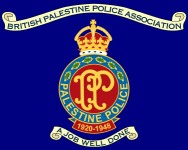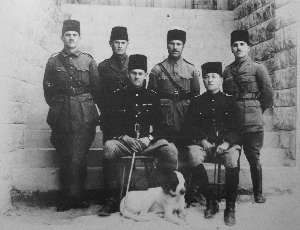Pages in Section 1

Captain James Mackenzie
i. Formation of the Palestine Police
ii. The Peoples of Palestine in 1920
iii. Early Port Police
iv. Early Clashes
v. Brief Existence of the PDF
vi. Formation of the Palestinian Gendarmerie
vii. Captain James Wesley Mackenzie
viii. 1922 Formation of the British Gendarmerie
Next Sextion
 In the Anglican Cathedral of St George in Jerusalem a plaque commemorates a Captain James Wesley Mackenzie of the Palestine Police who died a hero's death. Here is his story.
In the Anglican Cathedral of St George in Jerusalem a plaque commemorates a Captain James Wesley Mackenzie of the Palestine Police who died a hero's death. Here is his story.
James, born in Belfast, was a medical student in Cambridge when WW 1 broke out. He immediately joined up. After training, the army sent him to France as a 2nd Lieutenant with the Royal Fusiliers. Although severely wounded twice, once in the Battle of Loos and again in the battle of the Somme, he survived the war and was demobilized in Egypt in 1920.
Rather than returning to Cambridge to finish his studies, he joined the newly formed Palestine Police in what was still officially Enemy Occupied Territory, with the rank of British Reserve Inspector, the term used in those days for deputy assistant superintendents.
The first two years of his service were spent in hedonistic post-war Jerusalem, enjoying the company of the fishing-fleet, (debutantes whose mothers who dragged them through the middle-east and India in search of eligible sons-in-law, a rare commodity in England after the carnage of WW 1.) Despite this, James was immensely popular with his male colleagues. Early in 1922, he was posted away from Jerusalem into the real Palestine, to become police district commander in upper Galilee, where bandits roamed the wild hills and most of his time was spent patrolling the countryside on horseback in charge of a team of Arab and Jewish Police.
The tasks of police in Northern Palestine were not made any easier by the indignation of the local Arabs over the terms of the 1919 Paris Peace agreement in which the 1917 Balfour Declaration had been approved by the League of Nations. Instead of becoming part of an independent Arab Caliphate promised by the British, Arabs in Syria, Lebanon, Iraq, Transjordan and Palestine had all come under the control of either French or British governments.
On April 15th 1922, James was leading a patrol consisting of himself, Inspector Ibrahim Effendi Oweida and six Arab Constables all on horseback about ten kilometres south of Lake Galilee. Down there in the Rift Valley so far below sea- level, the temperature, touching on 100 F, was almost unbearable. The surrounding countryside was barren wilderness, apart from a jungle of reeds and low trees lining both sides of the River Jordan. The reeds hid the river from the patrol but the men could hear it. From the loud sound of rushing water, they could tell the river was in full spring flood. Their horses all needed water, but they had to wait for a path trampled through the reeds before riding the horses down to the river.
One of his men warned James that the Jordan at that time of the year was treacherous, but Inspector Oweida contradicted the man and rode his horse into the water, where he allowed it to stand and drink. Mackenzie followed him, but Oweida's horse began to sink into the soft mud of the river bed and struggled to free itself, throwing Oweida, who was unable to swim, into the water. James immediately jumped off his own horse into the river and succeeded in getting hold of his Inspector, but, handicapped by the man's weight, found himself unable to beat the strong current. Both men were carried away, never to be seen alive again.
When James' body was recovered, the British dark headstone over his grave was the first of many that were to appear among the local white stones in the cemetery on Mt. Zion. Some good, however, came from his sacrifice. The Palestine Police Force had no more difficulties in recruiting local Arabs because it was said among them, "These Inglizi will sacrifice their lives for us."
The plaque in the cathedral reads,
"To the glory of God and in memory of Capt. James Wesley Mackenzie of the Palestine Police (late Royal Fus,) who met his death in a gallant attempt to save the life of a brother officer, Inspector Effendi Oweida, in the river Jordan nr Jisr Mejamieh on 15th April 1922. Erected by his officers and friends.
* The officers in the back row are of interest. One is a Christian Arab, one a Muslim Arab and two are Jews. One of the Jewish officers later became chief of police in Israel. They all may have previously served with the Ottoman Police but would have been re-trained by the British.